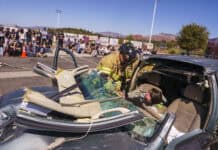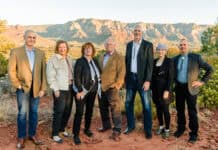Arizona Gov. Katie Hobbs signed House Bill 2048, which provides for the creation of Northern Arizona wine trail specialty license plates, into law on Friday, March 29. The legislation’s primary sponsor was Rep. Selina Bliss [R-District 1]; fellow Legislative District 1 Republicans Sen. Ken Bennett and Rep. Quang H. Nguyen cosponsored the bill.
The legislation’s list of supporters included the city of Cottonwood, the towns of Jerome and Clarkdale, the Verde Valley Wine Consortium, the Yavapai County Board of Supervisors and the Sedona Chamber of Commerce, among other local organizations.
“I have to brag a little about Danusia Szumowski,” Bliss said, referring to the bill’s author, who is a board member of the Verde Valley Wine Consortium. “She came to Arizona from California, they’re leaders in the world in viticulture. We’re next door to California. There’s no reason we can’t compete with them as far as the state because we have the climate, the soil. We have everything going over here, and these are low-water crops. There’s no downside to this, so this was an easy sell … and I was pleased to see the governor support this.”
One of Szumowski’s incentives for drafting the legislation was to provide a passive income stream for the Verde Valley Wine Trail, a 501(c)(3) organization of area wineries, as $17 of the $25 annual fee for each plate will be donated to the organization.
“The economic impact of the Arizona wine industry has been steadily increasing,” Szumowski wrote in a letter to the Legislature in support of the bill. “A soon to-be-published 2023 Northern Arizona University study for the Arizona Office of Tourism will show that Arizona’s wine industry created an estimated $351 million in total economic output last year, supporting an estimated 2,430 full-time job equivalents, generating a total of $115 million in labor income. The industry contributed an estimated $191 million in value-added GDP and generated nearly $40 million in taxes, of which almost $17 million is state and local tax.”
The funds from the plates will go towards four main initiatives: The expansion of vineyards, increasing sustainable vineyard agriculture practices, tourism marketing and public education “on safe alcohol consumption practices,” Szumowski said, adding that those projects are currently under development.
The organization still needs to raise about $7,000 to cover the $32,000 in design costs for the plates, which will need to be approved by the Arizona Department of Transportation. They recently raised $20,000 toward the cost with a dinner in Cottonwood. A design committee is also being set up to create the plates.
“A fascinating piece for me was how to write a bill and how to quote-unquote ‘constitutional,’ how to follow the guidelines,” Szumowski said. “I’ve never done anything like this at all; this was a complete masterclass in government.”
She said that learning to navigate issues such as tailoring the bill to cover a less-geographically specific area was the research aspect that was most enjoyable.
“It was fun to research how to position the bill … and then to work on the nuances and continue to sculpt the bill and find supporters,” Szumowski said. “[Bliss] also has a staff bill writer. So I drafted some initial wording, but I’m not a legal person. One of the fun things is hand over your idea and the bill writers go to work … I think anybody can get involved in this as a citizen. That was the main thing is that it’s doable … and just being focused, analytical, determined and persistent. I think that’s the recipe.”
Bliss said she considers constituent bills to be the most exciting.
“All you have to do is talk to your legislator,” Bliss said. “I have five or six bills that are a result of a constituent coming to me and saying, ‘We’ve got to do something about fill-in-the-blank.’”
Szumowski said the plates are currently planned to be available for purchase by the end of the year.






















